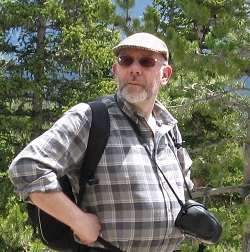Hydrogeologist fondly remembered by his students as a naturally gifted teacher and communicator

There are few teachers that really create an indelible impression on their students; Andrew was one of them. With his direct Yorkshire phrases and clear explanations of complex ideas, he introduced a large number of postgraduate students to groundwater modelling.
Early life and education
Born in Denholme in West Yorkshire, and educated at Bradford Grammar School, Andrew studied Civil Engineering at university. Employed by Sir William Halcrow, he worked on a number of projects, including the Faslane submarine base in Scotland. During this time, he became both a chartered Civil Engineer and an accountant!
An MSc in Water Resources and Technology at the University of Birmingham followed during the drought of 1975/6. Awarded Birmingham’s Ratcliff Prize, Andrew went on to complete a PhD on the South Humberbank study, a seminal groundwater project commissioned by the then Anglian Water Authority to investigate saline intrusion into the Chalk aquifer. His research encompassed novel features for the time: recharge modelling, numerical pumping test analysis, and regional groundwater modelling using self-written code. He later added solute transport modelling to his skills to examine both saline intrusion in various coastal aquifers and nitrate transport from agricultural land.
University of Birmingham
After his PhD, Andrew started lecturing at the University of Birmingham in 1978, teaching undergraduates and postgraduates and supervising PhD students. He was a naturally gifted teacher and communicator, who could bring complex subjects to life with just a piece of chalk and a blackboard. Students also recall debates in the local pub on the finer details of groundwater modelling. His door was always open to students to discuss the challenges groundwater modelling posed. Impromptu lessons were conducted as he tried, often unsuccessfully, to light his ever-present pipe.
His PhD students remember his painstakingly handwritten corrections to their thesis, providing them with a writing style that would stand them in good stead for their careers. Not only would he challenge ill thought out ideas, he would also insist that ideas be well presented. A debate he participated in at a Geological Society Hydrogeology Group meeting inspired an Environment Agency colleague to start the Groundwater Modellers’ forum with the aim of continuing these passionate and insightful discussions.
Later work and legacy
Andrew was continually exploring novel and advanced computational techniques to enhance the science of groundwater modelling. Later work focussed on computationally efficient numerical methods to simulate groundwater flow across spatial scales. This led on to research considering how object-oriented software development approaches could be used to make groundwater modelling code more flexible and adaptable. An approach which facilitates the coupling of models was a novel development at the time, but such methods are now standard.
His legacy is a core group of UK and international groundwater modellers who were taught how to build models from the ground up, think carefully about groundwater hydraulics, and describe their findings clearly.
Andrew was also a warm hearted and loyal friend, and a devoted husband. He regularly attended the City of Birmingham Symphony Orchestra and enjoyed spending his holidays in Scotland.
He will be fondly remembered by many worldwide. He is survived by his widow, Margaret.
By Andrew Hughes